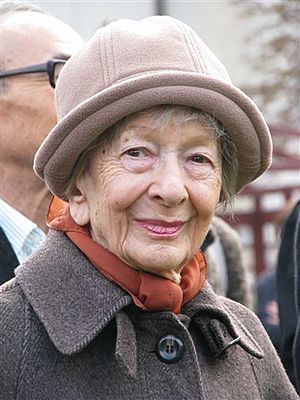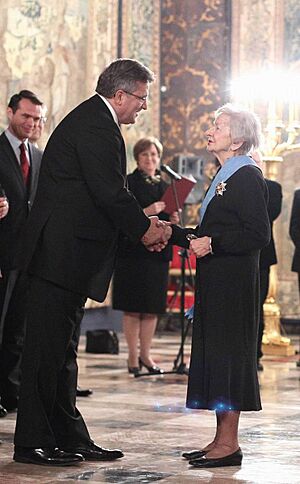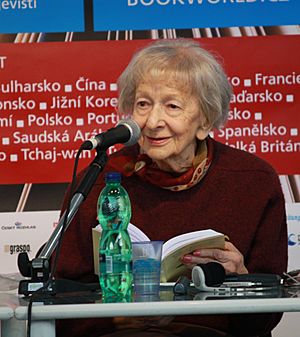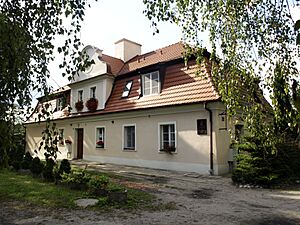Wisława Szymborska facts for kids
Quick facts for kids
Wisława Szymborska
|
|
|---|---|

Szymborska in Kraków, Poland, 2009
|
|
| Born | Maria Wisława Anna Szymborska 2 July 1923 Prowent, Poznań Voivodeship, Poland (now Kórnik, Poland) |
| Died | 1 February 2012 (aged 88) Kraków, Poland |
| Occupation |
|
| Notable awards |
|
| Signature | |
Wisława Szymborska (born Maria Wisława Anna Szymborska) was a famous Polish poet, essayist, and translator. She was born on July 2, 1923, and passed away on February 1, 2012. In 1996, she won the important Nobel Prize in Literature.
Szymborska was born in a place called Prowent, which is now part of Kórnik, Poland. She lived in the city of Kraków for most of her life. Her books were very popular in Poland. She even wrote a poem called "Some Like Poetry" where she joked that maybe only two out of a thousand people truly enjoy poetry.
The 1996 Nobel Prize in Literature was given to her for her "poetry that with ironic precision allows the historical and biological context to come to light in fragments of human reality." This award made her known all over the world. Her poems have been translated into many languages, including English, Arabic, Japanese, and Chinese.
Contents
Wisława Szymborska's Early Life
Wisława Szymborska was born on July 2, 1923, in Prowent, Poland. She was the second daughter of Wincenty and Anna Szymborska. Her father worked as a manager for a Polish count named Władysław Zamoyski.
After the count died in 1924, her family moved to Toruń. Then, in 1931, they moved to Kraków. Kraków became her home for the rest of her life.
Education and Early Career
When World War II started in 1939, Wisława continued her schooling in secret. These were called underground classes. From 1943, she worked for the railroad. This job helped her avoid being sent to Germany for forced work.
During this time, she started her artistic journey. She drew pictures for an English textbook and began writing stories and poems for special occasions. In 1945, she started studying Polish literature at Jagiellonian University in Kraków. She later switched to sociology.
She met many writers in Kraków and was inspired by them. Her first poem, "Szukam słowa" (meaning "Looking for words"), was published in a newspaper in March 1945. She kept publishing poems in different newspapers. In 1948, she had to stop her studies because she didn't have enough money.
That same year, she married a poet named Adam Włodek. They divorced in 1954 but remained good friends. She also worked as a secretary and an illustrator. Her first book of poems was supposed to be published in 1949. However, it was not allowed because it "did not meet socialist requirements" at the time.
Political Views and Changes
Early in her career, Szymborska supported the official ideas of the People's Republic of Poland. She even signed a paper in 1953 that criticized Polish priests. Her first poetry collection, Dlatego żyjemy (That is what we are living for), included poems that supported socialist ideas. For example, she wrote poems about Lenin and the building of a new industrial town called Nowa Huta. She also joined the ruling Polish United Workers' Party.
However, as time went on, Szymborska started to disagree with the socialist government. She began to connect with people who spoke out against the government, known as dissidents. Even though she didn't officially leave the Communist party until 1966, her views changed. In 1957, she became friends with Jerzy Giedroyc, who ran an important Polish magazine in Paris. She wrote for his magazine. In 1964, she spoke out against a protest that supported the Communist government. Instead, she asked for freedom of speech.
Working as an Editor
In 1953, Szymborska started working for a literary magazine called Życie Literackie (Literary Life). She worked there until 1981. From 1968, she wrote a popular book review column called Lektury Nadobowiązkowe (Non-required Reading). Many of these essays were later published in books.
From 1981 to 1983, she was an editor for another magazine in Kraków called NaGlos (OutLoud). In the 1980s, she became even more active in opposing the government. She wrote for a secret underground newspaper called Arka using a different name. She also continued to write for Kultura. In the early 1990s, she wrote a poem that supported a vote against the government.
Her last collection of poems published while she was alive was Dwukropek (Colon). Readers of a Polish newspaper chose it as the best book of 2006. She also translated French literature into Polish, especially older poetry.
Death and Final Works
Wisława Szymborska passed away peacefully at her home in Kraków in 2012. She was 88 years old and had lung cancer. Her friends and family were with her.
She was still writing new poems when she died. However, she couldn't finish arranging them for publication exactly as she wanted. Her final poems were published later in 2012. In 2013, the Wisława Szymborska Award was created to honor her amazing work.
Themes in Wisława Szymborska's Poetry
Szymborska often used clever ways to explore big ideas in her poems. She used irony, paradox (things that seem impossible but are true), and understatement. Many of her poems talk about war and difficult events.
She often wrote from unusual perspectives. For example, one of her famous poems is told from the point of view of a cat whose owner has died. Even though she is very famous, she published a relatively small number of poems, fewer than 350. When asked why she didn't publish more, she famously said, "I have a trash can in my home," meaning she threw away many poems she didn't think were good enough.
Wisława Szymborska in Pop Culture
Szymborska's poetry has inspired many artists.
- Her poem "Buffo" was turned into music by Barbara Maria Zakrzewska-Nikiporczyk in 1985.
- The film Turn Left, Turn Right used her poem "Love at First Sight." The film Three Colors: Red was also inspired by this poem.
- In her last year, Szymborska worked with a Polish jazz musician named Tomasz Stańko. He dedicated his album Wisława to her memory.
- Her poem "People on the Bridge" was made into a film by Beata Poźniak. This film was shown around the world.
- In 2022, the singer Sanah adapted Szymborska's poem "Nothing Twice" into a song. This was part of Sanah's project based on Polish poetry.
Major Works by Wisława Szymborska

Here are some of Wisława Szymborska's most important collections of poetry:
- 1952: Dlatego żyjemy ("That's Why We Are All Alive")
- 1954: Pytania zadawane sobie ("Questioning Yourself")
- 1957: Wołanie do Yeti ("Calling Out to Yeti")
- 1962: Sól ("Salt")
- 1966: 101 wierszy ("101 Poems")
- 1967: Sto pociech ("No End of Fun")
- 1967: Poezje wybrane ("Selected Poetry")
- 1972: Wszelki wypadek ("Could Have")
- 1976: Wielka liczba ("A Large Number")
- 1986: Ludzie na moście ("People on the Bridge")
- 1989: Poezje: Poems, bilingual Polish-English edition
- 1992: Lektury nadobowiązkowe ("Non-required Reading")
- 1993: Koniec i początek ("The End and the Beginning")
- 1996: Widok z ziarnkiem piasku ("View with a Grain of Sand")
- 1997: Sto wierszy – sto pociech ("100 Poems – 100 Happinesses")
- 2002: Chwila ("Moment")
- 2003: Rymowanki dla dużych dzieci ("Rhymes for Big Kids")
- 2005: Dwukropek ("Colon")
- 2009: Tutaj ("Here")
- 2012: Wystarczy ("Enough")
- 2013: Błysk rewolwru ("The Glimmer of a Revolver")
Prizes and Awards

Wisława Szymborska received many honors for her work:
- 1954: The City of Kraków Prize for Literature
- 1963: The Polish Ministry of Culture Prize
- 1974: Knight's Cross of the Order of Polonia Restituta (a high Polish award)
- 1990: Kościelski Award
- 1991: Goethe Prize (a German award)
- 1995: Herder Prize (an Austrian award)
- 1995: Honorary Degree from Adam Mickiewicz University
- 1996: The Polish PEN Club prize
- 1996: Nobel Prize in Literature
- 1996: Person of the Year by Wprost magazine
- 1997: Honorary Resident of the Royal Capital City of Kraków
- 2005: Gold Medal for Merit to Culture - Gloria Artis (a Polish cultural award)
- 2011: Order of the White Eagle (Poland's highest honor)
See also
 In Spanish: Wisława Szymborska para niños
In Spanish: Wisława Szymborska para niños
- List of female Nobel laureates
- List of Nobel laureates in Literature
- List of Polish Nobel laureates
- List of Polish-language poets
- Wisława Szymborska Award
- Polish Writers on Writing featuring Wislawa Szymborska. Edited by Adam Zagajewski (Trinity University Press, 2007).
 | Isaac Myers |
 | D. Hamilton Jackson |
 | A. Philip Randolph |


